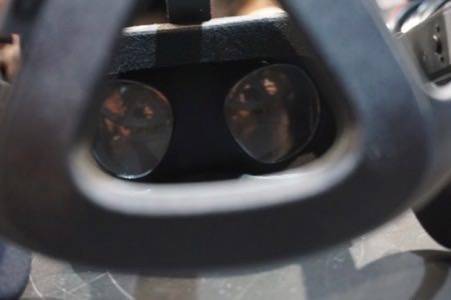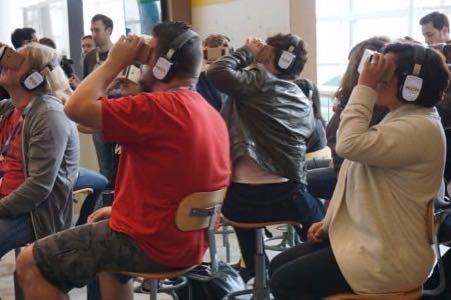Virtual reality wants to envelop everyone’s eyeballs, not just those of gamers. The nascent industry wants couch potatoes, too.
Oculus, the Facebook-owned VR gear maker that has come to embody the current virtual-reality wave, has been lobbying hard to make VR cinema an actual thing. The company just struck a deal last week with VR production pros Felix & Paul Studios to produce immersive experiences for its own upcoming Rift headset and Samsung’s Gear VR.
The announcement bills the partnership as the “largest live-action VR deal to date.” It’s the latest in a concerted push to extend the platform beyond gaming.
Such efforts, from multiple VR players, matters to everyone interested in the technology.
See also: Oculus Will Let You Grab Virtual Reality With Both Hands
If you’re a fan, get your face ready: You’ve got a lot more immersive videos to look forward to. Filmmakers have a new art form to play with (not to mention new tools). As for developers and hardware makers, deals like this could mean even more—like the potential to reach a huge audience.
Virtualizing Cinema

Felix & Paul Studios may be best known as the outfit that created the VR experiences for Jurassic World and Wild for the Gear VR. Considering the fact that Samsung’s goggles are powered by Oculus technology, it’s natural for the Rift to get in on the action.
For studio cofounder Felix Lajeunesse, VR cinema is an intriguing storytelling vehicle, and he wants a hand in shaping it: “Each project born out of our partnership with Oculus will be an occasion to explore VR’s unprecedented potential to immerse viewers in human-driven experiences in the fields of fiction and non-fiction storytelling as well as music and the performing arts,” he said in the press release.
Oculus has been touting the same line about VR’s artistic potential. But it’s not an indie filmmaker. It’s a tech company, and VR cinema is one way to push the platform beyond gaming to a larger audience.
Gamers are already passionate about VR, and they’re a natural fit, since games depend on sucking people into digital worlds. As many as 155 million Americans are already immersed in it, according to the Entertainment Software Association. That even trumps streaming subscribers, which are projected to reach more than 100 million people by the end of the year.
But that doesn’t take the whole audience into account. Include people who, say, spend hours on YouTube or Dailymotion, or watch cable TV and go to movies—in other words, everyone who enjoys videos and films—and that potential reach becomes massive.

If VR becomes a hot destination for must-see (and experience) video, pulling in big audiences, then it’s reasonable to believe those eyes will check out what else is in the store. It’s a retail “destination” play, in which sought-after shops or restaurants bring in business for an entire neighborhood.
That represents an important opportunity for VR app makers. While indie developers have a tough time standing out in the mature (and oversaturated) mobile app scene, virtual reality is only just starting to find its legs. For now, early entrants can make a mark in an exciting and far less crowded space.
For Oculus, the company has more than one reason to diversify its appeal. Perhaps the biggest: the HTC Vive. The (really excellent) rival headset, powered by Valve’s Steam OS, could give the Rift a run for its money on the gaming front. The company very almost certainly knows this, so it’s doubling down on the cinema side.
Video May Ignite The VR Star
One thing holding back this big cinema push: Oculus still doesn’t have a consumer product yet. Its Rift facegear won’t hit the market until early next year. But that’s not stopping it from lining up works, so they’re ready to grab eyeballs from the get-go.
It’s not the only tech company actively pursuing immersive VR videos. Earlier this year, Samsung announced that it struck a deal with David Alpert, executive producer of The Walking Dead, to produce a series for its Milk VR service. Google also recently gave YouTube support for 360-degree video, so Cardboard users and others can enjoy cat videos or whatever else creators want to wrap around viewers.

For the Rift maker, the Felix & Paul deal is its latest move in a string of cinema initiatives. The Facebook-owned VR company already introduced Story Studio, a group of Hollywood veterans (including Pixar animation pros) who have been working to produce VR short films. The company also evangelized its platform at the Cannes Film Festival recently, in an effort to court filmmakers.
See also: Samsung Is Getting Serious About Producing Its Own Virtual-Reality Videos
It’s a mad scramble by all the VR makers to make sure the pipes are filled. There’s a lot at stake. If successful, such efforts could lift the whole industry—and turn virtual reality into real success.
Photos by Adriana Lee





















